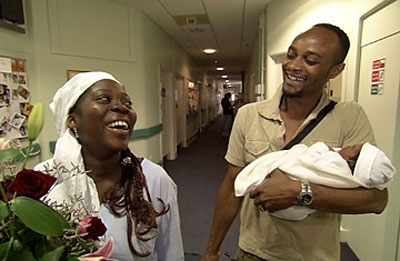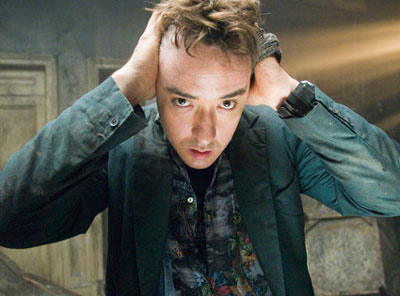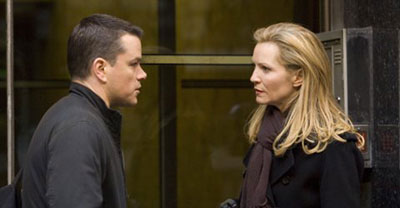|
Michael Moore does not specialize in reasoned debate, so why do people keep demanding it of him? He's a polemicist, an advocate, a self-proclaimed editorialist. He poses, he grandstands, he waxes wise and drips sarcastic wit. He relishes the piercing stiletto of the cheap shot, the bayonet thrust of the funny or tragic anecdote that illustrates his point, and the wicked rapier slash of confronting his opponents in their most unguarded moments.
Moore's best films—such as Bowling for Columbine and Fahrenheit 9/11—work because the cold, hard facts justify both his outrage and his outrageousness. (I remember the standing ovation that greeted the sold-out premiere of Fahrenheit 9/11 in Washington; I was one of those standing and cheering, and I'd stand and cheer again.) His lesser works—and I place Roger & Me in that category, though I know most viewers wouldn't—lose points because Moore can't resist mocking the low along with the high, using his camera to skewer those who either don't deserve the skewering or who aren't in a position to skewer back. The "Pets or Meat" rabbit lady from Roger & Me was a hoot, to be sure, but was it really fair for Moore to drag her from peaceful obscurity? Even his best movies contain moments of dubious fairness: his final confrontation with then-National Rifle Association President Charlton Heston in Bowling for Columbine is appropriately compelling, until you remember that the elderly Heston was probably in the beginning stages of Alzheimer's disease by that time.
The first half of Sicko, Moore's latest movie, is such a masterful, blazing call to arms that, alas, it makes the second half that much more of a letdown. Of all the topics that merit Moore's scornful attention, the hideous, Byzantine mess of the American health care system tops the list. Moore barrages us with horrifying, tear-jerking stories of ordinary Americans betrayed by the U.S. health insurance industry's single-minded dedication to profit. We learn of the little girl who died because Kaiser Permanente didn't insure the emergency room her mother took her to; of the man who died because his insurance company ruled that his pending bone-marrow transplant was an "experimental treatment;" of the once-prosperous couple forced to move in with their grown children because they had to choose between their medications or their house; of elderly patients, still in their nightgowns, dumped by hospitals at a homeless shelter because their insurance had run out; of 9/11 rescue workers who can't get the treatment they need for the illnesses they contracted working at Ground Zero. Mixed in with these anecdotes is testimony from former employees of health insurance companies who break down weeping as they recall rejecting claims they knew to be valid, because they would be fired if they didn't. "These people didn't fall through the cracks," one former insurance company hatchet man says. "They were swept toward the cracks and pushed down them."
 |
Having presented the problem unforgettably, Moore nevertheless fumbles the solution. If any subject cries out for an infusion of reason, it is health care, but Moore—the left's answer to General Patton—can only lead the charge into battle. The thesis of the second half of Sicko is simple: that virtually every country in the world has a better health care system than the United States. It is undeniable that the countries Moore surveys—Canada, Great Britain, France, Cuba—have ensured their citizens will never go bankrupt because of health care costs, in itself a tremendous advantage over the American system. But Moore sweeps other questions—such as the prompt availability of treatment in those countries—under the rug. As always, he relies on anecdotes to prove his point. See? There's no waiting line at this free clinic in Ontario! This doctor in London has a good income, despite being in the National Health Service! This couple in Paris has a comfortable lifestyle, despite their tax bill to pay for universal health care! This medication is available for pennies in Havana, instead of the many dollars it costs in New York! Moore gets so carried away by his anecdotes that, in showing a World Health Organization survey that lists the U.S. as thirty-seventh in health care in the world and France as first, he fails to notice (or deliberately ignores) that the WHO places Cuba thirty-ninth.
This is annoying compared with the incredible power of Sicko's first half. (Given Moore's usual M.O., however, I couldn't exactly call it disappointing.) It's nothing, however, compared to the merry pranks Moore pulls at the film's end. Here, more than ever, he's a cross between Abbie and Andy, Hoffman and Kaufman. He takes a boatload of 9/11 workers with medical problems to the shores of Guantanamo, where through a bullhorn he demands the same free health care for them that the prisoners get; then, having received the expected non-response, he then takes his group to Havana, where they are received as heroes and given the treatment they need, gratis. It's difficult to say what's harder to swallow about this sequence: its obvious stage management by the Castro government, or its exploitation of the plight of unfortunate people—especially ones who really did perform heroic services for their country.
Moore ends the film by revealing an act of charity he performed. I won't tell you what it is, but I think it will strike most viewers less as charity and more as self-aggrandizing revenge. Moore will earn no points in Heaven for it. And yet—just for the act of filming Sicko, with all its outrageous flaws—he probably will earn points. As I write this column, the BBC World News is reporting that the United States has fallen to forty-second overall in world longevity statistics, and a longevity expert is saying that the U.S. health insurance industry is in substantial part to blame for this. It reminds me that, seeing Gore Vidal on his innumerable talk show appearances over the years, I wanted to strangle him fairly often. Yet—particularly in light of the current administration—Vidal has come more and more to sound like America's true prophet. Michael Moore is Gore Vidal with a baseball cap, a camera and an extra hundred pounds. America needs its gadflies, and needs them desperately, no matter how much the buzzing bothers us.
Mikael Hafstrom's 1408 and Paul Greengrass' The Bourne Ultimatum have no obvious similarities to Sicko (though the latter film undoubtedly reflects Michael Moore's views of the CIA). Both are commercial entertainments of unusual excellence. One could call them escapist, except that the main point of both films is that the greatest horrors in our lives come from our inability to escape from ourselves.
Writers Matt Greenberg, Scott Alexander and Larry Karaszewski adapted a Stephen King short story into the screenplay of 1408, which tells the story of Mike Enslin (John Cusack), a moderately successful writer who specializes in debunking "haunted hotels" and other ghostly phenomena. Hearing about Room 1408 of New York's Dolphin Hotel—a room that allegedly has led dozens of patrons over the decades to hurl themselves from its fourteenth-floor window—Enslin heads for the hotel immediately. The hotel manager (Samuel L. Jackson) offers Enslin all sorts of bribes to dissuade him from staying overnight in Room 1408, which only strengthens Enslin's resolve: what does this guy have to hide, anyway?
 |
Of course, Enslin soon discovers the answer to that question, emphatically. It's no fair to say anything more about what happens, except that you soon will find yourself gnawing your knuckles, your popcorn box and the seat in front of you. Both for sheer suspense and for polished filmmaking, 1408 deserves to be ranked with the best screen adaptations of King's work. Hafstrom and the screenwriters find fresh, surprising ways to use such familiar tropes as the false ending; even more, they make the film matter by keeping it focused on the extremely human face of Enslin, a man forced by the malevolent room to face long-ignored crises of faith, grief and loss. And, in John Cusack, what a great, human face they have. Front and center throughout the movie, Cusack gives a bravura, Oscar-caliber performance in a role that goes beyond taxing, both physically and emotionally. Despite all the spectacular special effects and jump-out-of-your-skin fright moments, it is Cusack you will remember from 1408. The film is well-cast throughout: Jackson brings his usual deft charisma to the unremarkable role of the hotel manager, and there are notable contributions in even briefer roles by Mary McCormack, Tony Shalhoub, and Len Cariou.
While 1408 gives us the usual breather before the action starts, The Bourne Ultimatum throws us right into the thick of it, never letting up from the opening police pursuit in Moscow to the final, breathless moments in New York's East River. A rogue CIA operative has been feeding a London reporter (Paddy Considine) inaccurate stories of Jason Bourne's career as an agency assassin, and Bourne (Matt Damon) immediately goes into action. He wants to set the record straight; even more, he continues to have troubling gaps in his memory, as to how he was recruited and trained as a stone killer, and he figures the rogue op knows much more than he's telling. Unfortunately, so do Bourne's former bosses in the agency, and they go into action themselves to find and kill the rogue cop—and Bourne.
Greengrass—director of The Bourne Supremacy, the previous installment of the Bourne franchise, as well as the brilliant United 93—keeps The Bourne Ultimatum moving, moving, moving. It is hard to think of any recent action movie that even approaches the kinetic energy and rollercoaster suspense of The Bourne Ultimatum, though God knows many have tried. Aided by the masterful contributions of cinematographer Oliver Wood and editor Christopher Rouse, Greengrass finesses the nonstop action like a master juggler, gliding seamlessly from car chase to rooftop pursuit to shooting spree. This is state-of-the-art action filmmaking, and all the audience can do is hang on for the death-defying ride.
Yet all the energy and excitement would be meaningless without a hero worth rooting for. Bourne, the brainchild of the late Robert Ludlum, is the obvious progenitor of 24's Jack Bauer. (Is it a coincidence Bourne and Bauer have the same initials? In the immortal words of Jerry Seinfeld, I think not.) As played by Matt Damon, Bourne comes across as a hybrid of Bauer, Spider-Man and the Energizer Bunny. But Damon also gives Bourne a human scale, a world-weary sadness, which makes him not only believable but deeply sympathetic. Bourne is a man filled with remorse for deeds he can only dimly recall; he hates the man he has become, and the bitter irony of his life is that his survival depends on being that man.
 |
As with 1408, The Bourne Ultimatum features a brilliant ensemble cast. Joan Allen and Julia Stiles are once again welcome presences, resuming their roles from The Bourne Supremacy as Bourne's only friends in the CIA—which is to say, in the world. Yet the juiciest supporting performance comes from David Strathairn as the loathsome Noah Vosen, the CIA's London chief. As portrayed by the usually righteous Strathairn, Vosen makes the previous Bourne nemeses played by Chris Cooper and Brian Cox seem positively cuddly by comparison. Scott Glenn and Albert Finney make their usual strong impressions in smaller roles as Vosen's co-conspirators. (Who can miss the irony of Glenn, who famously played a much more honorable federal agent in The Silence of the Lambs, playing the character he portrays here? I call it a sign of the times.)
|
|
